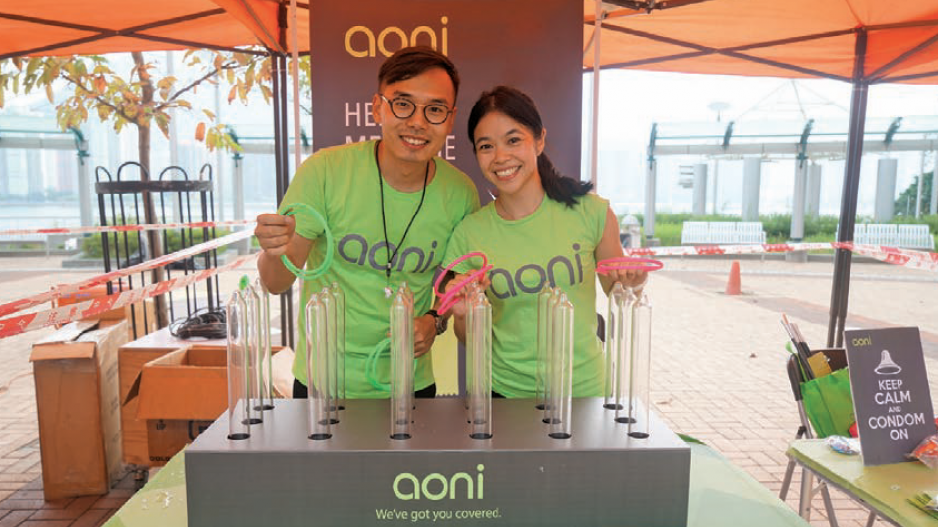A Hong Kong manufacturer of premium condoms – started by two University of British Columbia (UBC) graduates – is eyeing a return to Canada partly because of the strength of the country’s brand for lifestyle products.
Aoni Condoms brand creators Victor Chan and Genie Lam said they are looking to set up a manufacturing facility in the Lower Mainland, mainly because the United States is currently Aoni’s biggest market, and “Made in Canada” branding – along with shipping and import/export logistics – would resonate better with the company’s target consumers.
“I think there would definitely be an advantage,” said Lam, Aoni’s business development manager, about Canadian-made condoms. “Our 12-piece products range from $17.99 to $24.99, about double regular mass-market product. … Given how much R&D we put in, we really do need a market that is willing to pay for this type of stuff. Being made in Vancouver puts us closer to the clients who are willing to pay for premium products.”
The branding issue of a product being manufactured in certain markets overseas is not new. In the last 60 years, now-modernized economies like Japan, South Korea and Taiwan have all suffered periods of low brand prestige in the West before breaking through at varying times.
China is currently shifting its image from mass-manufacturing goods to more upscale value-added production, and others like Thailand and Indonesia are also going through different stages of change.
For Aoni, which has factories in Guangzhou, China, and Hong Kong, the decision to set up shop in the latter location also reflects company officials’ vision of the target market: young, global and premium. And new technology introduced by Chan – a UBC integrated engineering graduate – reduces Aoni’s need for staffing and factory space dramatically, allowing the company to establish facilities in Hong Kong (where land is exorbitantly expensive).
“For Hong Kong, we wanted a location where we can be close enough [to China] so we can jump between the factories regularly,” said Lam, a Vancouver native who moved to Hong Kong after marrying Chan, whose family helps run Daming United Rubber (Aoni’s parent firm) in Guangzhou.
“At the same time, Hong Kong does have a stronger brand image globally that people recognize and are more familiar with … and if we succeed [in Vancouver], we would be the first condom manufacturers in Canada. That would be a pretty big thing itself, because people like Canada and Canadians.”
But setting up shop in Vancouver is challenging.
Lam said Lower Mainland land costs have been higher than expected. Despite the comprehensive pitch by B.C. investment officials in Hong Kong on the feasibility to launch Aoni operations in Vancouver, Lam said the company needs to find an investor based in the city to make things work.
But Vancouver’s draw to Chan and Lam goes deeper than strictly business – a point noted by numerous local officials involved in attracting investment to B.C.
Lam said the fact that both she and her husband went to school in Vancouver made the city’s lifestyle a major factor in looking for a factory that would have easier access to North America’s West Coast. San Francisco and Los Angeles are among Aoni’s biggest consumer bases.
“To be realistic, if we were looking only at numbers, I think the U.S. may be more competitive,” Lam said. “But because of lifestyle, we definitely put more weight on Vancouver because of that. … And with the new manufacturing process, we need highly trained engineers to monitor and maintain the machines. When we asked ourselves where do we see our growing markets, our labour needs, and where do we want to live in the future, Vancouver was the first place on our minds.”
Officials in agencies like HQ Vancouver have repeatedly pointed to the potential of enticing wealthy Chinese immigrants – who moved here for the quality of life – to bring their business interests to the Lower Mainland as well.
Many of the companies that have been recruited by the joint federal-provincial group have had executives who live or lived in Vancouver prior to signing on to set up operations in B.C.
Lam added that the nature of Aoni’s business means that North America could have a higher growth potential because the public might be more receptive to having a bricks-and-mortar presence in addition to buying through e-commerce channels like Amazon (Nasdaq: AMZN).
“We thought about a cafe where customers can browse our products, but because Asia is relatively conservative – we’ve found it difficult to get people to talk about condoms on social media, even though people talk about it in closed groups a lot – we’ve put that idea on the back burner,” Lam noted. “But if we are in a market where people are open enough to talk about it, I think a presentation boutique would be a good idea for people to communicate.”
Aoni anticipates the Vancouver facility – if it gets the partnership investment it needs – will employ 25 workers, roughly the same number as are in the Hong Kong facility. Its Guangzhou factory employs 100.
A Global Industry Analysts Inc. report last year estimated that the global condom market will reach US$8 billion by 2022. Currently, the big three players – Ansell Ltd. (Lifestyles) (ASX:ANN), Church & Dwight Co. Inc. (Trojan) (NYSE: CHD) and Reckitt Benckiser Group plc (Durex) (LON:RB) – account for more than half of the overall market share, the report said. •




